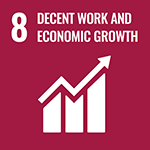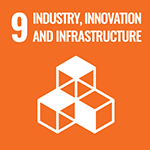Solving Social Issues Through Business
Applicable SDGs






The RACCOON Group’s corporate philosophy is “making corporate activities more efficient and convenient,” and to this end, we offer a variety of services such as EC business and financial business that form the infrastructure of transactions between companies. Through these services, we aim to help solve social issues and achieve a more convenient, abundant society.
Realization of fair & equitable trading environment
- Offering marketplace beyond distance, time, and industry
- The EC business of the RACCOON Group offers a fair & equitable trading environment by rectifying the imbalance caused by the size of a company and the type of industry/category of business, eliminating trade physical limitations to enable world-wide trade, and improving the efficiency of business practices where all companies from large companies to sole proprietors can trade on an equal footing.
As current movements, cases where businesspeople who are not retailers sell products such as clothes at a hair salon and health-enhancing products at a pharmacy are increasing. However, it is not easy to know suppliers who are in different industries. The Group also offers cross-industry purchase opportunities for businesspeople who enter a new business field. - Fair & equitable trade relation with “credence” as security by creative credit model
-
In the financial business, we have developed an in-house credit model by utilizing AI, and inspect the credibility for a variety of businesspeople from large companies to small businesses/sole proprietors for more than 100,000 cases annually. In common company credibility inspection, in most cases, small businesses and sole proprietors do not prepare the required information for the inspection, and their conditions tend to be unfavorable. For all companies which have difficulty in trading with the conventional inspection process, the Group derives the most appropriate credit line by utilizing unique data, and secures “credence.” Furthermore, we contribute to expand trading such as increasing credit lines by co-creating “credence” with companies.

Regional revitalization
- Supporting sustained development of regional economy with partners
- The RACCOON Group is actively involved in the business cooperation, and forms cooperative ties with local authorities, chambers of commerce, and regional banks to target the sustained development of regional economy.
In rent guarantee service of rental properties, we contribute to secure accommodation by forming cooperative ties with local authorities, and guaranteeing prospective tenants of public housing.
Also, we work to realize a society where everyone can live without fear through actively guaranteeing rent for those who are societally vulnerable such as welfare recipients, foreign trainees/technical interns, and single mothers. - Possibility of Made in Japan from local regions to world
- In the EC business, approximately 70% of members who use this service are businesspeople who locate their company address other than Tokyo/Osaka. For wholesale makers, the targets of market cultivation are throughout Japan, furthermore, 134 countries around the world. Overseas sales performance of products by small and medium-sized manufacturers is increasing, for example, such as Hasami ware which is local product of Nagasaki, and ladies' shoes made in a small factory in Ikuno, Osaka city. Through offering the opportunities to show new value of Made in Japan to the world, we support the vitalization of local industries and the succession of traditional techniques.
- Support for starting ideal shops in the countryside
- Businesspeople who use the RACCOON Group’s services can realize a rich selection of products steadily from countryside. Furthermore, in cases of new openings, purchasing products in volume is commonly required at the beginning. However, we support new business by giving a special credit line so that businesspeople can trade even without revenue due to preparation.
Sustainable consumption
- System to prevent excess inventory which plays a role in wholesale business
- In the EC business, we pursue the systems to prevent excess inventory as a social responsibility of the wholesale business. For example, production systems and price setting based on product returns are not needed by selling non-returnable products. Furthermore, selling products not by lots enables the purchase of products of only the quantity needed, and leads to the reduction of unsold goods of shops. Through these small efforts, we correct the systems of mass production/mass consumption/mass disposal, and aim to optimize the distribution of “Get the product I want, only the quantity I want, when I want” supply chain-wide.
- Enlightening “ethical consumption” to small business
- We promote awareness building/enlightenment measures for business such as retailers regarding “ethical consumption” which focuses on respect for human rights and environment conservation. We encourage trade of products whose origin and production background of raw material are clear, and offer information to support the promotion after purchase, with the key words such as “fair trade,” “organic,” and “recycle.” We will contribute to industry-wide awareness-raising with a view to offer sustainable procurement policies to suppliers in the future.
Actions for climate change
- Promoting digitization of trading between enterprises, and aiming to reduce greenhouse gas emissions
-
During regular trade between enterprises, transactions by paper such as estimates, purchase orders, and invoices occur in bulk. Each business of the RACCOON Group is online-based, and document data can be confirmed on the web, therefore, it can lead to promote going paperless. In that sense, the more business expands, the more CO2 emissions can be reduced compared to conventional trading processes. Also in the Company, we promote business digitalization such as digitalization of document applications, utilization of online business meetings, and implementation of e-contracts, and work to reduce CO2 emissions centering on going paperless. Furthermore, to face the urgent task of climate change, we consider extensive efforts in the future.

Stakeholder engagement
To solve social issues through the business, we appropriately communicate to stakeholders, work to build credibility while having a dialogue, and continuously improve business/organizational management. We also recognize the demands of society, and contribute to sustainable society development.






